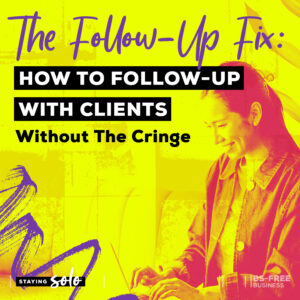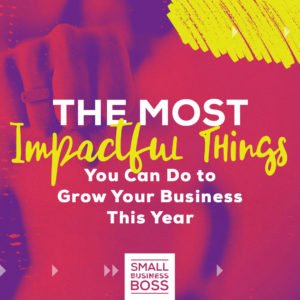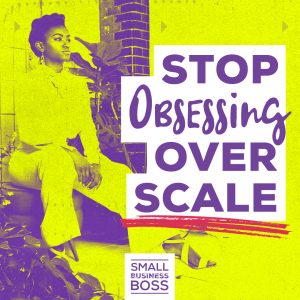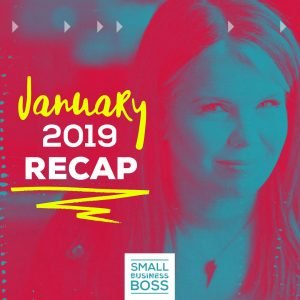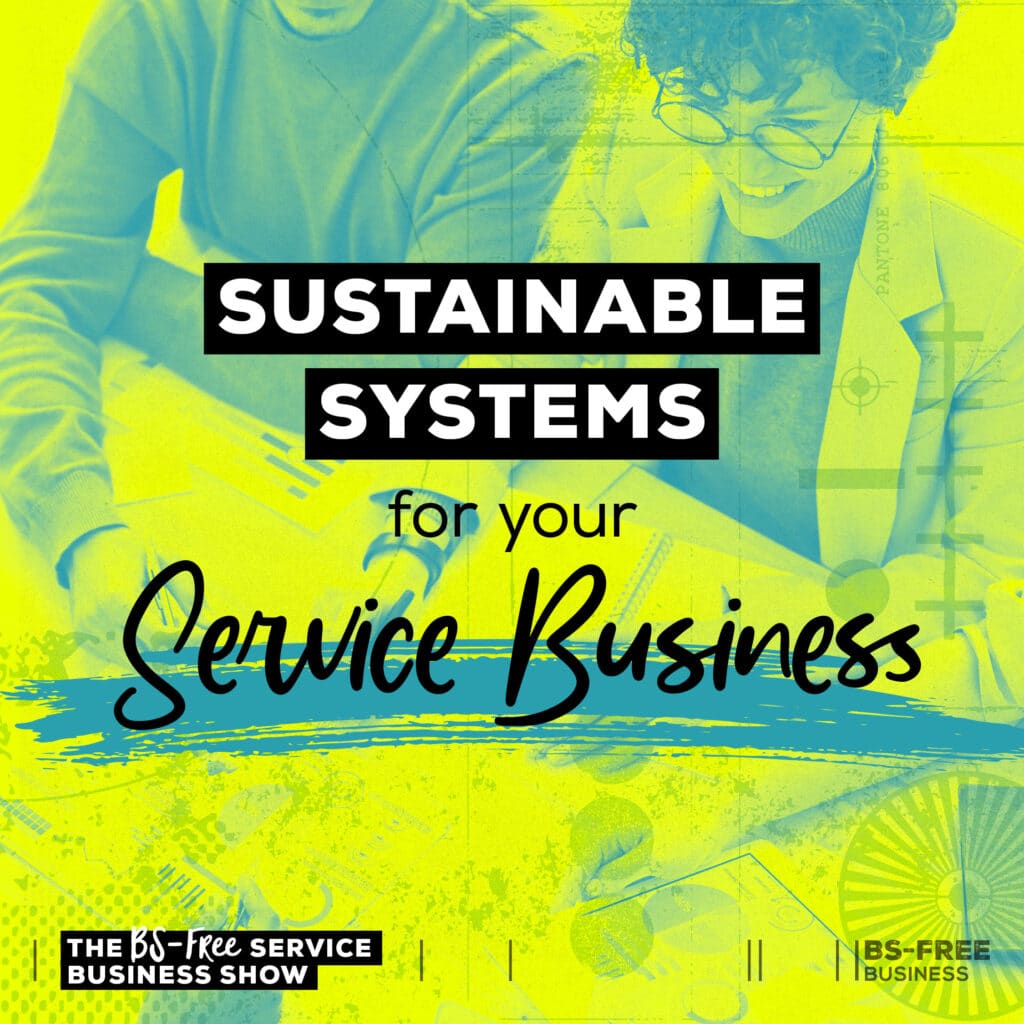
Search the site:
Sustainable Systems for Your Service Business
What if there was a way to do less of the things that drag you down and more of what you enjoy doing in your business? What if what you’ve been taught about systems is way too complicated for what you actually need?
In this episode, we’re talking about creating sustainable systems for your service business, including why it can be so much simpler than you may think.
Before we get into this episode, I want to talk about what exactly I mean by sustainable and systems.
In past episodes, I’ve shared how as solo or micro business owners, we need to stop worrying so much about scale and focus more on sustainability. The relentless pursuit of scale as it’s pushed in the online business world results in hustle, burnout and exploitation.
Prioritizing sustainability enables us to grow and maintain our businesses in a way that truly serves us now and for years.
Which is where systems come in. In this episode, when I talk about systems, I’m referring to processes that enable you to run your business not just efficiently but in a sustainable way as well.
I want to be clear on that as I know for years when people would talk about systems, it would make me roll my eyes as my brain was like, “that sounds boring and like it’s going to stifle my creativity.”
Little did I know I had a lot of systems in place in my years as a freelancer. These were things that let me run my business efficiently and save time. That experience, along with what has followed in my years as an agency owner, is what inspired today’s episode.
Complication and Complexity: The Enemy of Sustainability
The other inspiration for today’s episode is the sheer level of complication and complexity I see in the online business world regarding growing and running a business. (Thanks, celebrity entrepreneurs!)
That complexity exists to sell you a solution. It creates a problem so someone can offer you their course or group program.
While I firmly believe that business owners need to develop different types of skills at different stages, we need to remember there’s a multi-million dollar industry that exists to sell us things to build a business. It’s an ecosystem full of entrepreneurs selling to other entrepreneurs.
I recognize I’m part of this B2E ecosystem. However, I got here because I was tired of how craptastic solutions available in this market were and how so many things were seriously overpriced.
For your business to be sustainable, you need systems that support you daily. So often, I see systems that are overkill for the stage or type of business. For example, for your lead tracking, you likely don’t need a fancy dashboard when a Google Sheet would do.
With an overengineered process, we spend too much time, money, and energy on it. We may have to hire experts to set them up or manage them. They can be hard to get our team or our clients to use. We may not use them as we should, as they’re clunky or inconvenient.
That’s why I want to advocate for sustainable systems. Complexity is not sustainable, and it defeats the point.
What is a Sustainable System?
Now that you’re sold on having systems that help you daily, I want to dive into what makes a system sustainable.
For me, a sustainable system is easy-to-use and highly repeatable in the main areas of your business. This is not about having ten pages of documentation and 44 Loom videos but pre-deciding how and when you’ll do things.
Here are the key elements of a sustainable system:
Specific Steps
What is this used for, and why? When do you use it? It should include specific steps (at a high level) that are easy to follow and, ultimately, remember.
Tools
What tools do you use, and how do you use them?
Templates
What templates are required? How can you create them once and use them over and over?
The goal is that you’re pre-determining these elements and then creating systems that can become second nature to you. Depending on where you are in your business, this doesn’t necessarily mean you need documented, detailed step-by-step processes for each system.
If you’re a solo business owner with no intention of hiring, there’s likely no need for you to spend time and energy documenting systems. If you’re solo and think you may hire someone to help with that specific system in your business, then build it up over time. And if you’re an agency owner, you likely need more robust and sophisticated systems.
In all three scenarios, I still recommend that the system is simple and sustainable. If you’re spending days creating systems that aren’t going to see the light of day, that’s defeating the point. You’d be better served by creating the minimally viable version of the system and building it up organically over time.
Explore these questions to determine if a system is truly sustainable or not:
- Are the key decisions made in advance for me?
- Can I easily follow or refer to the system?
- Is it something that supports me consistently?
- Will this grow with me?
Finally, the most important aspect of the system is that it reduces the cognitive load of having to make decisions and figure things out.
Once I figured this out about systems, I was finally able to wrap my head around them as a way to make my life easier. I used to get so irritated by the push to document every tiny detail when I was a solo business owner.
At that point, I shifted my thinking from “this is annoying” to “this could be helpful” and mapped out systems for key elements of my business. The result was way less time spent on decisions sucking up needless space in my brain.
Systematize What Impacts You Most
In hindsight, I can see how that shift in thinking and a keen eye on the three pillars of my service business — marketing, sales, and service — set me up for future growth. My energy was shifted to focus on higher-value activities in the business and creative work.
When considering where you need sustainable systems as a service business owner, your marketing sales and service are likely the most crucial as they impact your ability to find, sell, and serve clients.
When I think about my business today, we’ve systematized most things we do, but in a very simple way. People are often surprised at how no-frills our systems are, but they work for us. More importantly, they free up time, and don’t waste time with lots of superfluous tools or requiring a lot of updates.
Within marketing, we have referral systems, social media systems, podcast production, blogging, and more. With sales, we’ve got systems for pricing, proposals, consult calls, and closing. Then, with client service, we’ve got project management, onboarding, payments/invoicing, and more.
Every one of these things enables me to do the work I want to do and not worry about little details.
When you think about your sustainable systems, consider where you’re wasting time or feeling like you’re reinventing the wheel every single time. Also, anywhere you feel frustrated is a surefire sign you need to map out your system.
Also, consider where you can better serve your clients with systems. Your client experience can easily be overlooked, but it’s likely somewhere you can make ongoing improvements. Never underestimate how improving onboarding or client communications can make your life easier.
Finally, remember that you don’t have to have it all perfectly done today; the key is to get the basics covered. Concentrate on making them bite-sized and manageable and build from there. Over the next few weeks, we’re going to talk about the specifics of sustainable systems for your marketing, sales, and service.
Also, a heads up (if you’re listening in real-time) that our Spring sale is coming next week, and everything in the BS-Free Business shop will be 35% off. If you need a kickstart with any of your systems, these low-cost products will help you get started.
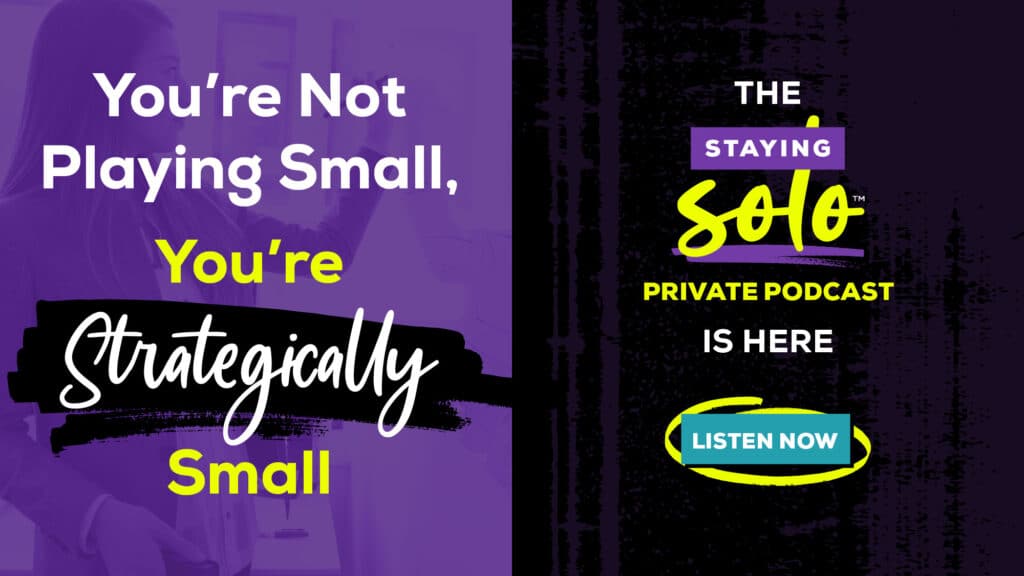

I’m Maggie Patterson (she/her), and services businesses are my business.
I have 20+ years of experience with client services, am a consultant for agency owners, creatives, and consultants, and vocal advocate for humane business practices rooted in empathy, respect, and trust.
Read or Listen to the Latest
For Solo Business Owners

Growing a solo service business is tough.
It’s even harder when you’re bombarded with BS advice that steers you away from your values and why you started your business in the first place.
This is the podcast for solo creatives and consultants who want to remain as a team of one and have zero interest in the hustle and grind of typical business teachings.
Subscribe now and never miss an episode.
For Micro Agency Owners
Most podcasts for agency owners obsess over revenue growth as the ultimate success metric.

But here’s the truth: not everyone wants to make millions. Your goal might be to build a sustainable business that lets you have a life and doesn’t run you into the ground.
Join me as I spill my shameless confessions and share everything I’ve learned about building a micro agency that skips the BS of tired and typical agency teachings.
Follow Now on All Major Podcast Platforms

